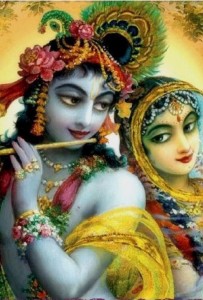

Chapter 6 from the book, The Nectar of Govinda-līlā, 4th edition (Second Printing), by Śrīla Bhaktivedānta Nārāyaṇa Mahārāja
A reason given as to why Śukadeva Gosvāmī did not directly mention Śrīmatī Rādhārāṇī’s name in Śrīmad-Bhāgavatam is because Mahārāja Parīkṣit had only seven days to live, and uttering Rādhikā’s name would have thrown Śukadeva into ecstatic trance for six months. In the Brahma-vaivarta Purāṇa it is mentioned:
śrī-rādhā-nāma-mantrena
murcchā ṣaṇ-māsikī bhavet
noccāreta mātra spaṣṭaṁ
parīkṣid-dhita-kṛn-muniḥ
If Śukadeva Gosvāmī uttered the name of Śrīmatī Rādhikā, he would at once remember Her pastimes. Due to 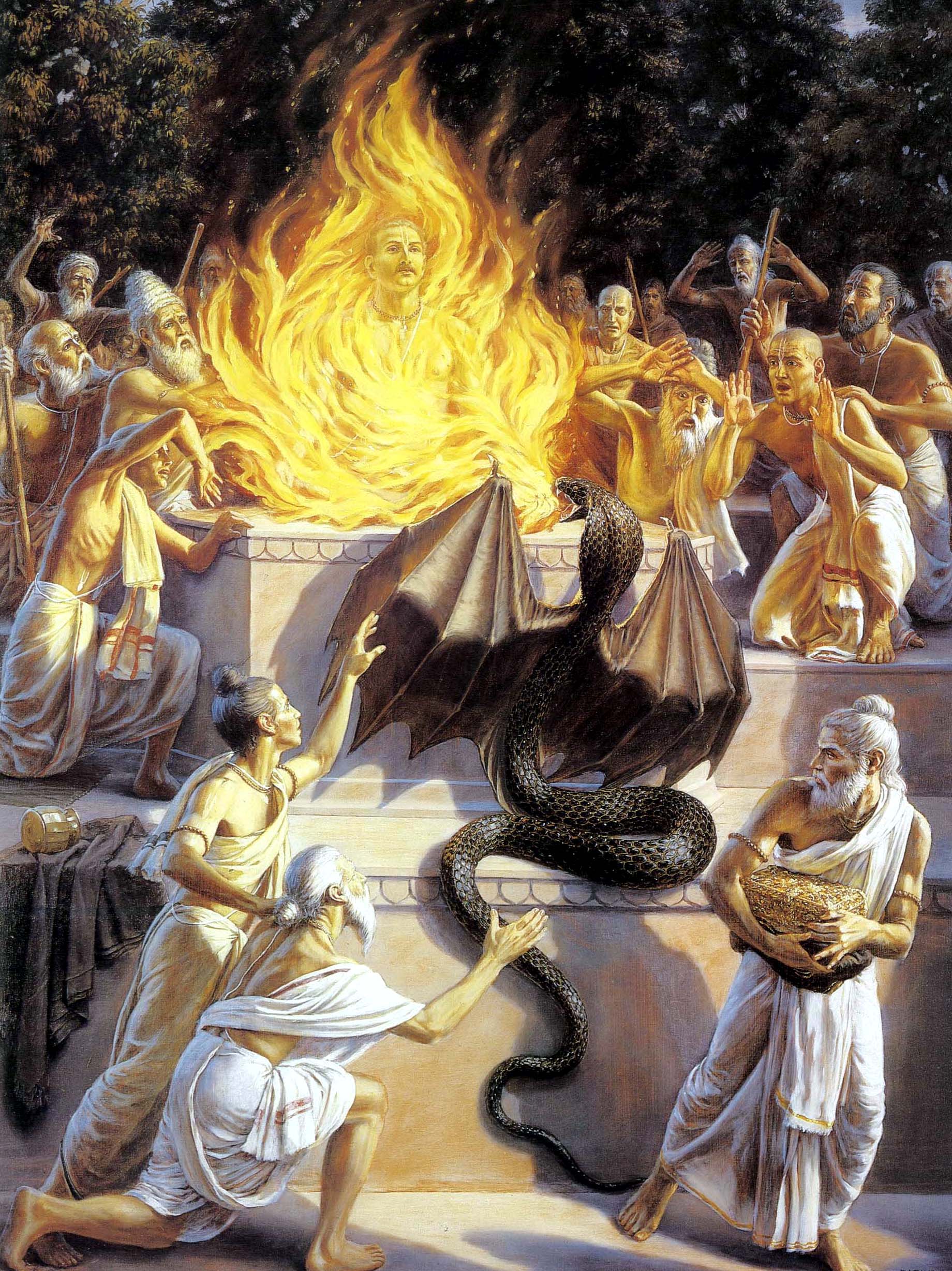 his rādhā-prema, he would have become āviṣṭa-citta, excited and fixed in remembering Her pastimes and activities in the service of Kṛṣṇa. He would then have become internally fixed on Kṛṣṇa and externally inert for six months. But Parīkṣit Mahārāja had only seven days to live, and Śukadeva wanted him to have the benefit of hearing the entire Śrīmad-Bhāgavatam.
his rādhā-prema, he would have become āviṣṭa-citta, excited and fixed in remembering Her pastimes and activities in the service of Kṛṣṇa. He would then have become internally fixed on Kṛṣṇa and externally inert for six months. But Parīkṣit Mahārāja had only seven days to live, and Śukadeva wanted him to have the benefit of hearing the entire Śrīmad-Bhāgavatam.
Why would Śukadeva Gosvāmī go into an ecstatic trance at the mere mention of the name of Śrīmatī Rādhikā? In his commentary on his own Bṛhad-bhāgavatāmṛta, Sanātana Gosvāmī writes: “Śrīmatī Rādhikā was the worshipful goddess of Śukadeva Gosvāmī, so whenever he uttered Her name, he would become āviṣṭa-citta, internally spiritually excited and externally inert. So in Śrīmad-Bhāgavatam he has given the name of Rādhikā and other gopīs in a hidden way.” Śukadeva Gosvāmī has therefore not uttered Her name directly, but only indirectly. According to the rasa-śāstra, an indirect utterance is better than a direct one.
vedā brahmātma-viṣayās
tri-kāṇḍa-viṣayā ime
parokṣa-vādā ṛṣayaḥ
parokṣaṁ mama ca priyam
Śrīmad-Bhāgavatam (11.21.35)
[Kṛṣṇa said:] The Vedas, divided into three divisions, ultimately reveal the living entity as pure spirit soul. The Vedic seers and mantras, however, deal in esoteric terms, and I am also pleased by such confidential descriptions.
So Śukadeva Gosvāmī also uttered the gopīs’ names indirectly, as in the word anayārādhitaḥ (Śrīmad-Bhāgavatam (10.30.28)), which indicates that gopī by whom Kṛṣṇa was perfectly worshipped, Śrīmatī Rādhikā. A rasika-bhakta can understand that it was Śrīmatī Rādhikā who had most perfectly worshipped Kṛṣṇa, whom Kṛṣṇa had taken away from the arena of the rāsa dance and whom He had disappeared with in the forest. It was only this gopī whose head and feet Kṛṣṇa had decorated in a secluded place. Even upon uttering the word ārādhitaḥ, which indicates Śrīmatī Rādhārāṇī and sounds so much like Her name, Śukadeva Gosvāmī at once started becoming āviṣṭa-citta. But after becoming so emotional, he then changed the subject.
Also, in Śrīmad-Bhāgavatam (2.4.14), Śukadeva Gosvāmī used the word rādhasā, meaning “Kṛṣṇa’s unequalled 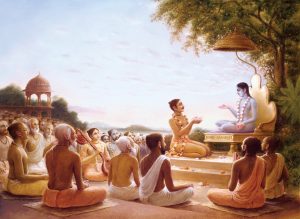 opulence”, as an indirect reference to Śrīmatī Rādhikā. Sanātana Gosvāmī says that in the five chapters of the Tenth Canto of the Bhāgavatam that describe the rāsa dance, in the Gopī-gīta, in the Bhramara-gīta and in the Uddhava-sandeśa, Śukadeva Gosvāmī has also carefully used other words to indirectly denote Śrīmatī Rādhikā. He has used the words kāścid dohaṁ hitvā in verse 10.29.5, the words tais taiḥ padaiḥ in verse 10.30.26, the words yāṁ gopīm anayat in verse 10.30.35, the words sā vadhūr anvatapyata in verse 10.30.38 and the words kācit karāmbujaṁ śaurer in verse 10.32.4. Each of these quotes denotes Śrīmatī Rādhikā and the other gopīs. Those who are rasika-bhaktas, whose eyes are open, can see the names of the gopīs and the name of Śrīmatī Rādhikā everywhere, but those who are blind cannot. Therefore we are especially grateful to Sanātana Gosvāmī, for without his revealing these truths to us, we could never understand.
opulence”, as an indirect reference to Śrīmatī Rādhikā. Sanātana Gosvāmī says that in the five chapters of the Tenth Canto of the Bhāgavatam that describe the rāsa dance, in the Gopī-gīta, in the Bhramara-gīta and in the Uddhava-sandeśa, Śukadeva Gosvāmī has also carefully used other words to indirectly denote Śrīmatī Rādhikā. He has used the words kāścid dohaṁ hitvā in verse 10.29.5, the words tais taiḥ padaiḥ in verse 10.30.26, the words yāṁ gopīm anayat in verse 10.30.35, the words sā vadhūr anvatapyata in verse 10.30.38 and the words kācit karāmbujaṁ śaurer in verse 10.32.4. Each of these quotes denotes Śrīmatī Rādhikā and the other gopīs. Those who are rasika-bhaktas, whose eyes are open, can see the names of the gopīs and the name of Śrīmatī Rādhikā everywhere, but those who are blind cannot. Therefore we are especially grateful to Sanātana Gosvāmī, for without his revealing these truths to us, we could never understand.
But why would Śukadeva Gosvāmī really become so emotional at the mere mention of the name of Śrīmatī Rādhikā? In the Bhāgavatam it is often stated, “śrī śuka uvāca.” Śrī śukā means śriyā śukā, or the śuka, parrot, of Śrī, Śrīmatī Rādhikā. In his Śrī Ānanda-vṛndāvana-campū, Kavi Karṇapūra explains that previously Śukadeva was the parrot of Rādhikā, and used to sit on Śrīmatī Rādhikā’s left hand while She would feed him the seeds from a pomegranate fruit. She would pet him affectionately telling him, “Bolo Kṛṣṇa! Kṛṣṇa!” This parrot would 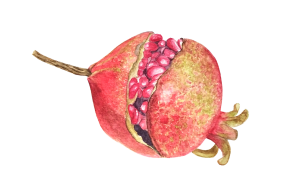 then sweetly utter the names of Kṛṣṇa.
then sweetly utter the names of Kṛṣṇa.
Once he flew into Kṛṣṇa’s garden at Nandagrāma where he began singing “Kṛṣṇa, Kṛṣṇa” as sweetly as Śrīmatī Rādhikā Herself would, and in the same melodious tone. Hearing this, Kṛṣṇa was very attracted, and noticing this beautiful parrot sitting in the pomegranate tree, He said, “Please speak some more.” Then the parrot began to lament, “Oh, I am very wretched and ungrateful because I was sitting in the hand of Śrīmatī Rādhikā Herself, and She was feeding me pomegranate seeds, milk and rice. She was teaching me how to sing ‘Kṛṣṇa, Kṛṣṇa’ very sweetly, but I flew away and have come here, so I am very unfortunate.” Then Kṛṣṇa took the parrot in His hand and began to stroke it. In the meantime, Lalitā and Viśākhā came and said, “This parrot belongs to our mistress, Śrīmatī Rādhikā. It is so dear to Her that She cannot live without it, so please give it to us, and we will return it to Rādhikā.”
Kṛṣṇa replied, “If it is really Hers, then when you call it, it will come to you. And sakhīs, if he is not really Hers, then he will not come to you.”
They tried many times to call the parrot, but it would not come to them. Then they began scolding Kṛṣṇa, saying, “Whatever comes to You never gets returned to its rightful owner!” Next they approached Mother Yaśodā and explained the situation, so Yaśodā came and snatched the parrot away from Kṛṣṇa, saying, “You are always doing nothing but playing with animals and birds! It is time for Your bath. Your father is ready to take his meal, but without You he cannot take it. So come at once!” Then she gave the parrot to Lalitā and Viśākhā and dragged Kṛṣṇa away.
Before Rādhā and Kṛṣṇa returned to Goloka Vṛndāvana, They told the parrot, “You must remain in this world to propagate Śrīmad-Bhāgavatam.” The parrot began to weep, but They both told him, “Except for you there is no qualified personality to manifest the Bhāgavatam, so you must remain here.” So after the disappearance of Rādhikā and Kṛṣṇa, the parrot began searching for a place where Kṛṣṇa-kathā was being spoken. Knowing that Śaṅkara was a great devotee of Kṛṣṇa, he flew to Kailāsa Mountain, where he found Śaṅkara reciting that same Śrīmad-Bhāgavatam to his wife Pārvatī. So he sat in a tree, and being well camouflaged, his presence was unknown to Śaṅkara.
Because the first three cantos of Śrīmad-Bhāgavatam are very philosophical, in accordance with the nature of a woman Pārvatī fell asleep as she was hearing it. She wanted to hear only the romantic pastimes, especially how Rādhā and Kṛṣṇa would meet and walk and laugh together. Now and then the parrot would reply, “Yes, yes,” and 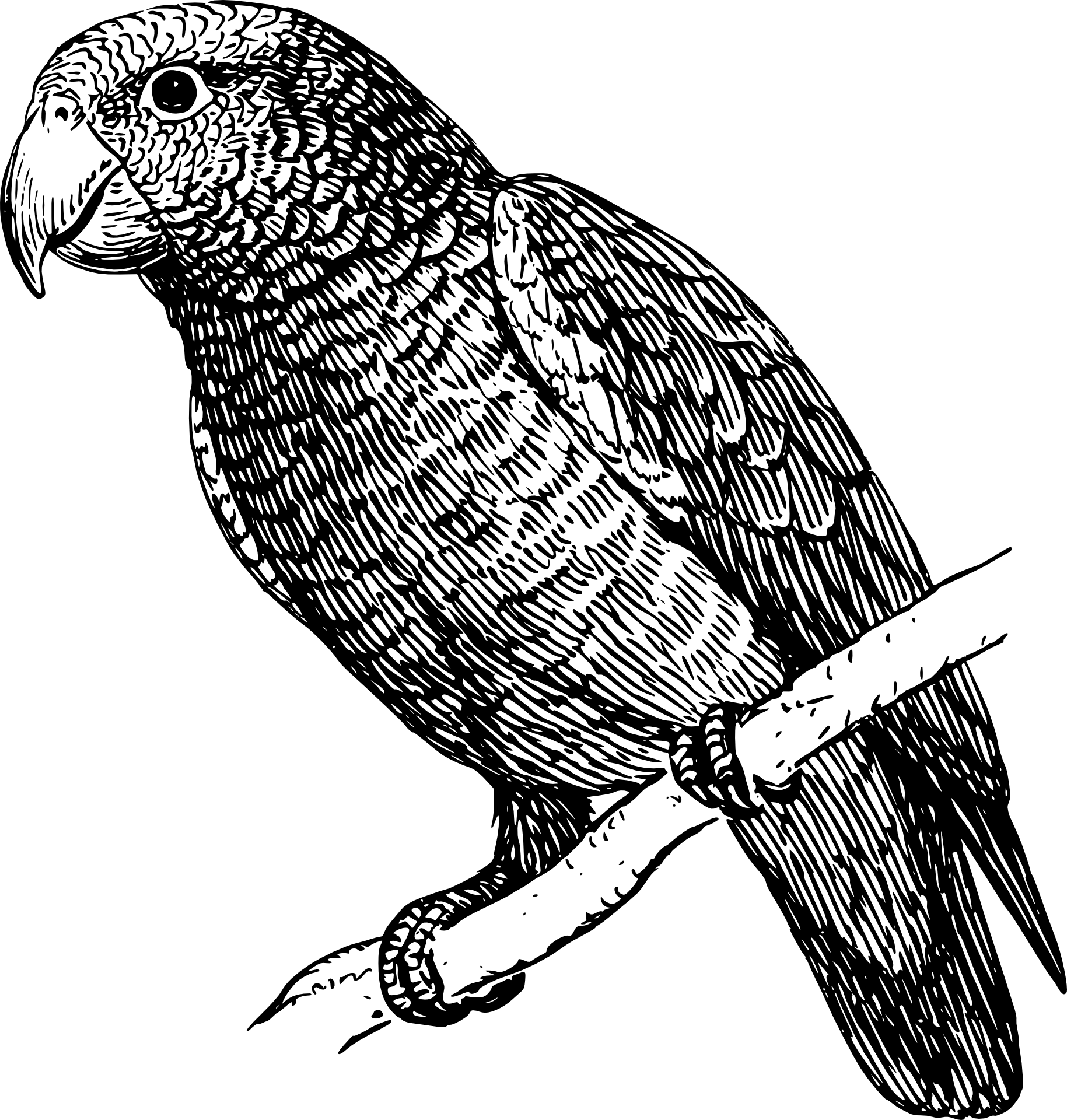 Śaṅkara would carry on eagerly reciting, thinking that Pārvatī was listening.
Śaṅkara would carry on eagerly reciting, thinking that Pārvatī was listening.
When Śaṅkara completed reciting the Twelfth Canto, Pārvatī at once awakened and said, “But I have not heard what I desired to! Have you already spoken the Tenth Canto? Please recite it to me again.” Then Śaṅkara thought, “Then who has been hearing, and from time to time saying, ‘Yes, yes, it is very nice’ in the same tone as Pārvatī?” He began searching, and then, noticing that there was a very beautiful parrot sitting on the branch of a nearby tree, he thought, “A parrot can imitate anyone’s voice, so perhaps he has been saying it. No unqualified person should hear Śrīmad-Bhāgavatam. Because he is a bird, he is unqualified, so he should be immediately killed, otherwise he may misuse what he has heard.” Picking up his trident, Śaṅkara went to kill the parrot, but it flew away and entered the āśrama of Vyāsadeva on the bank of the river Ganges at Badarikāśrama. There he saw that Vyāsadeva was reciting the same Śrīmad-Bhāgavatam to his wife, who was so wonderstruck upon hearing it that her mouth was hanging open in astonishment. Therefore the parrot flew into her mouth and went inside her. Pursuing that parrot, Śaṅkara arrived there with his trident in his hand and said, “Vyāsadeva, I offer praṇāma to you. I am following a parrot – have you seen it?”
Laughing, Vyāsadeva replied, “Why are you searching for a parrot?”
“I want to kill it.” “Why?”
“Because he has heard Śrīmad-Bhāgavatam, but he is unqualified to have done so.”
“May I ask you what is the result of hearing the Bhāgavatam?”
“One becomes immortal.”
“So if he has now become immortal, how will you kill him? You should abandon this idea and return to your 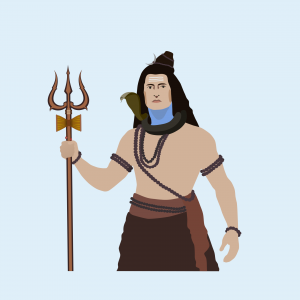 āśrama.” Realising that the parrot could not be killed, Śaṅkara returned to Kailāsa. After living in his mother’s womb for sixteen years, this parrot appeared in the form of Śukadeva and later spoke the Bhāgavatam. So because Śukadeva was previously śriyā śuka, the parrot of Śrīmatī Rādhikā Herself, he was so rasika that he could not utter the name of Rādhikā without becoming āviṣṭa-citta.
āśrama.” Realising that the parrot could not be killed, Śaṅkara returned to Kailāsa. After living in his mother’s womb for sixteen years, this parrot appeared in the form of Śukadeva and later spoke the Bhāgavatam. So because Śukadeva was previously śriyā śuka, the parrot of Śrīmatī Rādhikā Herself, he was so rasika that he could not utter the name of Rādhikā without becoming āviṣṭa-citta.
Other Purāṇas mention Śrīmatī Rādhārāṇī directly, but these Purāṇas are not one hundred per cent free from the tinges of fruitive activity (karma) and impersonal knowledge (jñāna). Śrīmad-Bhāgavatam is beyond the other Purāṇas and unique in its freedom from all expressions other than the glorification of Kṛṣṇa-bhakti. No hint of karma or jñāna taints its pages.
The goal of the Bhāgavatam, in essence, even more than glorifying Kṛṣṇa, is to glorify Śrīmatī Rādhārāṇī. This is so because Rādhikā possesses the most selfless love for Kṛṣṇa, more than the other residents of Vṛndāvana, and even more than the other gopīs. This being true, the Bhāgavatam thus mentions the glories of Rādhikā in practically every verse. Those who have the eyes to see can perceive Rādhikā’s name everywhere, in every verse. But Śukadeva Gosvāmī has carefully spoken Śrīmad-Bhāgavatam so that these glories are mentioned only indirectly. This is natural, for one keeps those things which are dearest to him hidden, protected from the unqualified who cannot fully appreciate them. As a chaste wife covers her head in public with her sārī and uncovers it only in the presence of her husband, so Śukadeva has presented the truth about Śrīmatī Rādhikā in a covered fashion. Only the rasika-bhaktas, who possess the proper eligibility, can actually pierce Śukadeva’s covering.
Another analogy can help us to understand this point. The naked body of a woman is not so beautiful, but if she covers her body with a fine transparent cloth and then water is poured on that cloth, each of her features are revealed. This is how to appreciate the beautiful features of a woman. Similarly, the glories of Śrīmatī Rādhikā are enhanced through the thin covering supplied by the author, the supremely intelligent Śukadeva Gosvāmī. Covering Her supreme position also enhances the ultimate revelation of those glories, as things obtained with hardship are appreciated more than those easily attained. Therefore the attainment of prema must necessarily include the overcoming of obstacles.
Like oil hidden within mustard seeds or butter hidden within milk, the glories of Śrīmatī Rādhikā are hidden within Śrīmad-Bhāgavatam. But the foolish cannot recognise them. The commentaries of Śrīla Jīva Gosvāmī and Śrīla Viśvanātha Cakravartī Ṭhākura, however, reveal those glories to us. In verse 10.14.34, Brahmā prayed to become a blade of grass in Vṛndāvana so he could catch the dust from the feet of all the residents of Vraja. Uddhava, on the other hand, also desired to take birth as a blade of grass in Vṛndāvana, but only wished to obtain the dust of the feet of one gopī. (The word caraṇa-reṇu, meaning “the dust from the feet,” is singular in verse 10.47.61.) He wanted only the dust from the feet of that gopī who had gone off alone during the rāsa dance. And who was that gopī ? Śrīmatī Rādhikā.
After leaving the gopīs during the rāsa dance, Kṛṣṇa was smiling a mild, closed smile. Inside, He felt ashamed that He had caused the gopīs some difficulty. Verses 10.32.4, 5, 7 and 8 describe how one gopī (Candrāvalī) 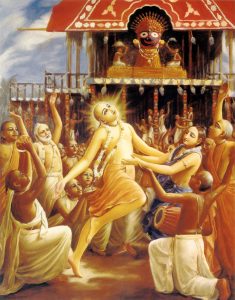 took Kṛṣṇa’s feet in her lap, another (Śyāmalā) took His hand, another (Śaibyā) took His other hand, yet another (Padmā) mildly chastised Him, another (Lalitā) said with some sarcasm, “Oh, You are a very good friend!” and another (Viśākhā) was crying. Verse 10.32.6 describes a seventh gopī who exhibited māna, jealous anger, from a distance, expressing through Her glance that She believed Kṛṣṇa was ungrateful, considering all that the gopīs had done for Him. This was Śrīmatī Rādhikā.
took Kṛṣṇa’s feet in her lap, another (Śyāmalā) took His hand, another (Śaibyā) took His other hand, yet another (Padmā) mildly chastised Him, another (Lalitā) said with some sarcasm, “Oh, You are a very good friend!” and another (Viśākhā) was crying. Verse 10.32.6 describes a seventh gopī who exhibited māna, jealous anger, from a distance, expressing through Her glance that She believed Kṛṣṇa was ungrateful, considering all that the gopīs had done for Him. This was Śrīmatī Rādhikā.
Śrī Caitanya Mahāprabhu is Kṛṣṇa Himself having assumed the mood of Śrīmatī Rādhikā, and He tells us that the gopīs are the best worshippers of Kṛṣṇa. If Śrīmad-Bhāgavatam did not contain the glories of Śrīmatī Rādhikā, Śrī Caitanya Mahāprabhu would have never touched it. But because Her glories are present within every verse, He embraced the Bhāgavatam close to His breast.
Thus Śrīmad-Bhāgavatam is certainly the spotless Purāṇa, and because of its level of presentation of rasa and siddhānta, it is without a doubt the most authorised scripture.
Image/Art made possible by Pixabay.com & Krishnapath.org








